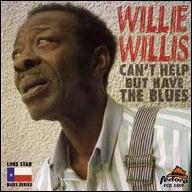The Willis brood was in the two-digit range, but only one of his sisters played music. The pressure coming from behind her perch on the piano bench and from his mother was for him to get in on any and all church-going serenading opportunities. The blues won in this classic battle of good and evil, repeated like a mantra in almost every biography from the genre. Speaking of mantras, Willis remembers the first song he learned to play being Boogie Chillun by John Lee Hooker, inspiring female schoolmates to bribe him to play it endlessly with piles of peanut butter sandwiches. These musical influences, Hooker and peanut butter, would have to be combined with hillbilly music for a realistic Willis table of contents.
Despite the obvious appeal of this combination, the man's recording career never seemed to really click. He bid a Good Black Night on a 1956 single for the Ride label, but did not get to cut his first album until 33 years later. His Down Home in Dallas CD in 1994 was the one that really hipped the international blues audience to the location of this unique talent.
He had many formative experiences as a professional musician in the military, ironically, where a small combo he formed felt the excitement of a building career, getting alloted larger and larger broadcast spots and taking command of regular gigs at various base dances. Willis' main collaborator in the band was Grady Young, likewise a guitarist who was playing both blues and country. Young also sang, which Willis was not doing at this point. Through the '50s, Willis was back in Dallas trying to figure out how to pay the rent, going through disappointing experiences which included attending barber school, battling layers of bureaucracy connected to actually opening a hair chop shop, emotionally failing at the rigors of a job in a funeral home and winding up employed as a dishwasher.
The Willis tale does not end up with a dull thud, however, nor with the sound of piles of dishes breaking in frustration. Even in the restaurant business, he was able to reverse his fortunes, working his way up to the top of the food chain as a kitchen steward. In the meantime he played the blues, mostly on weekends, in the company of many greats including Lowell Fulson, T-Bone Walker, Johnnie Taylor, and Joe Simon. He also tried to keep his own combo Willie Willis the Wildcatters busy in small clubs. Some of his closest associates included the dynamic guitarist Freddie King, with whom he sometimes played bass, and Mercy Baby, a singer and drummer whose name is absolutely brilliant considering that his wife killed him. ~ Eugene Chadbourne, Rovi

















